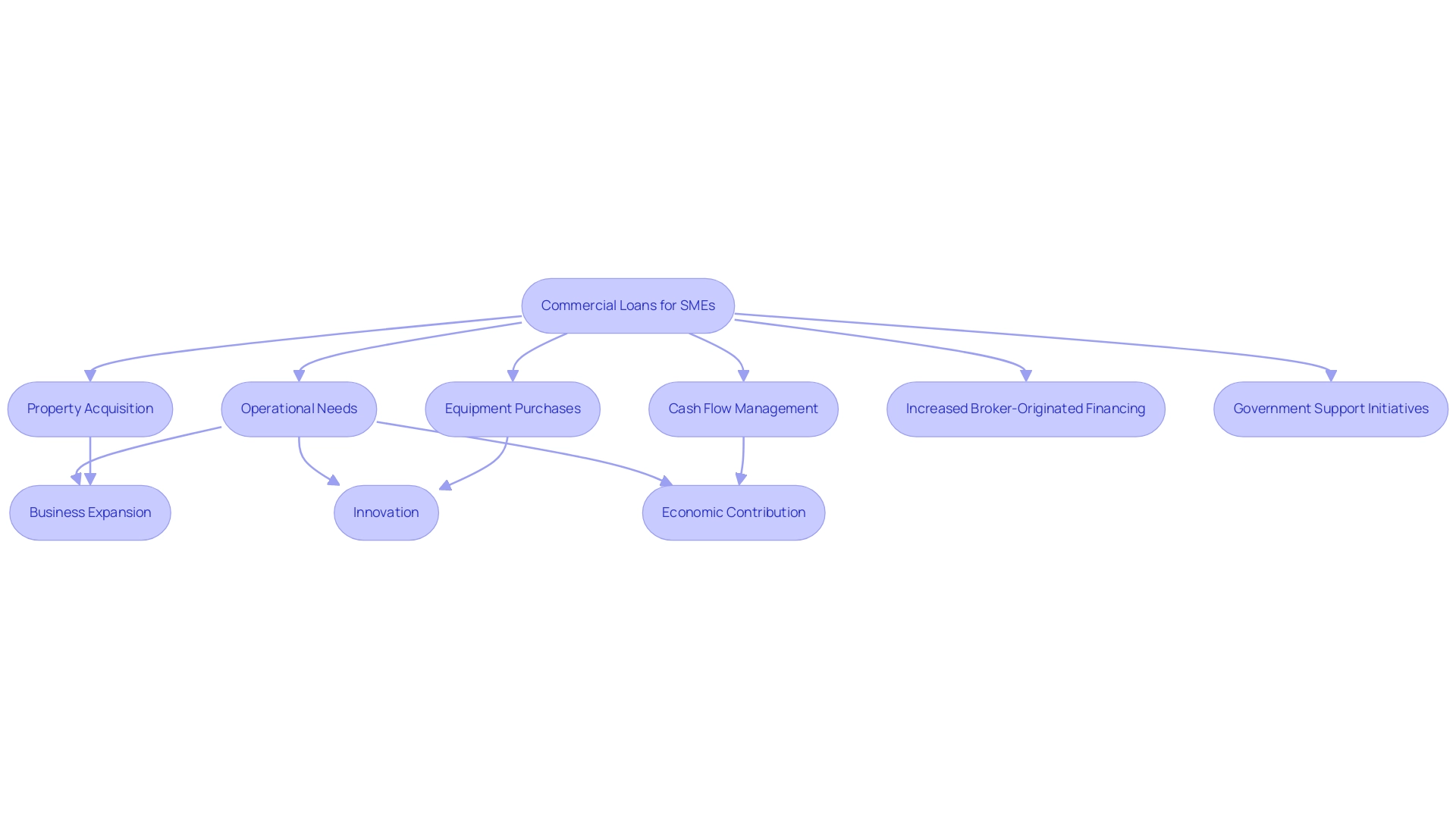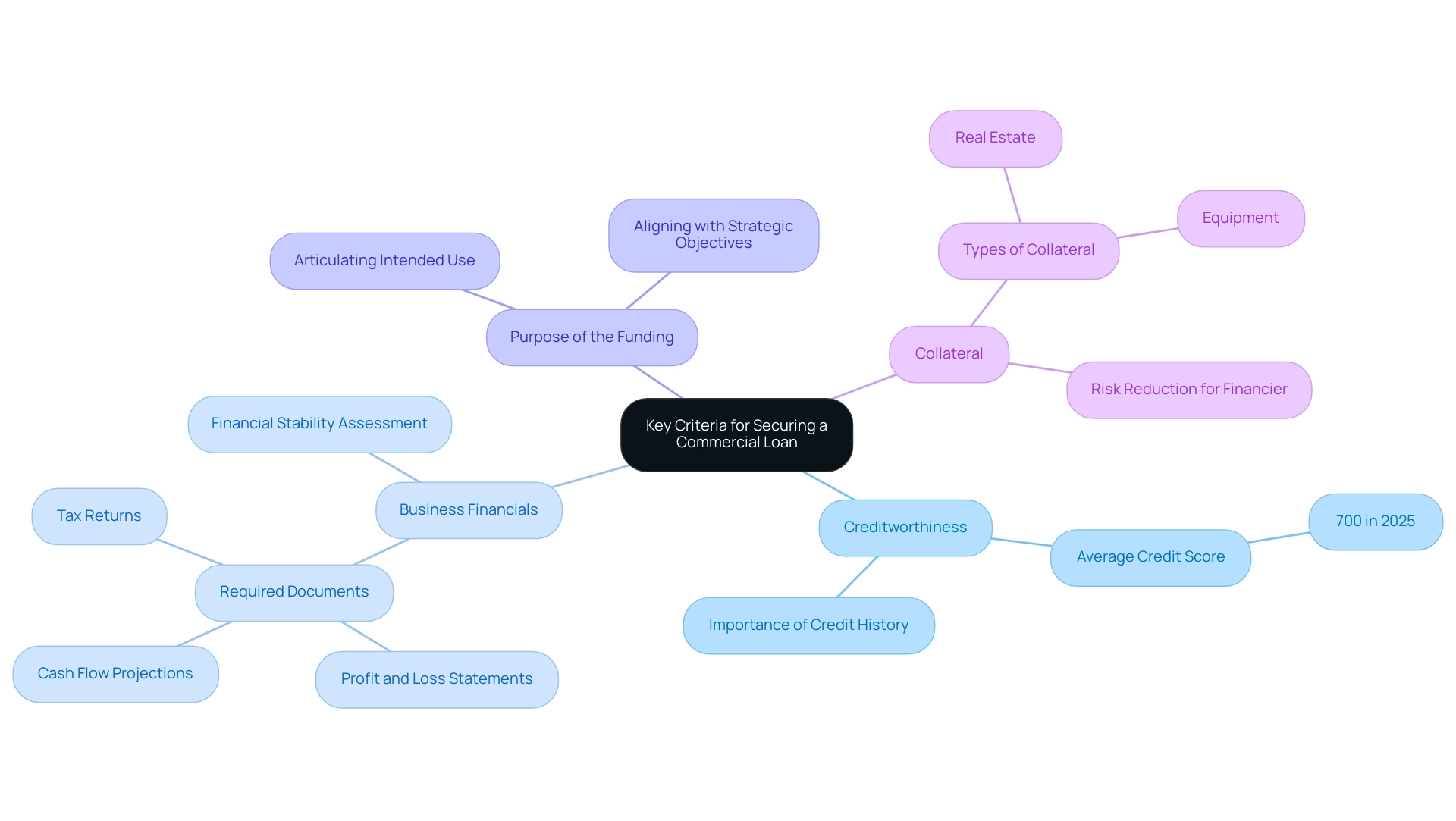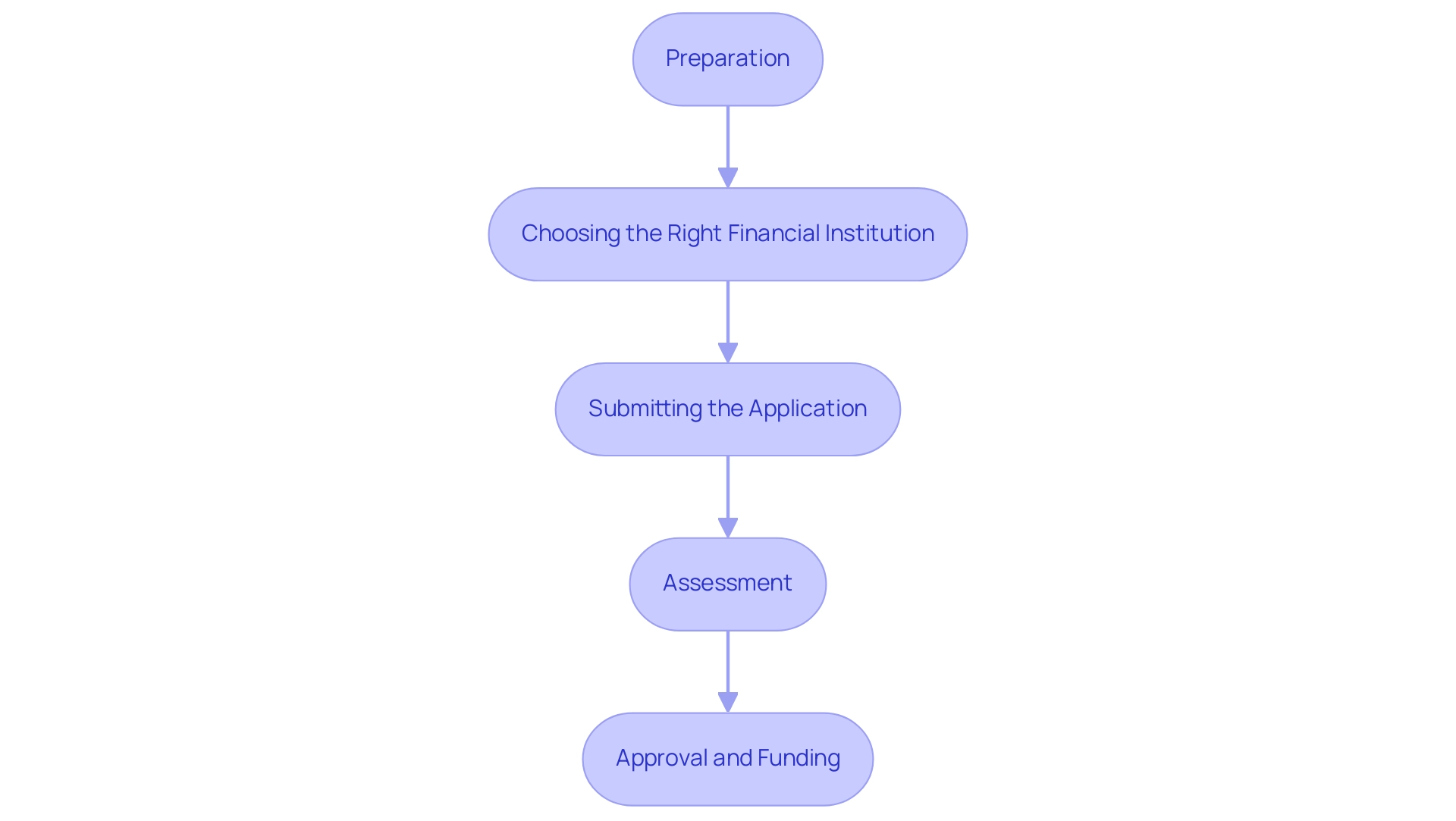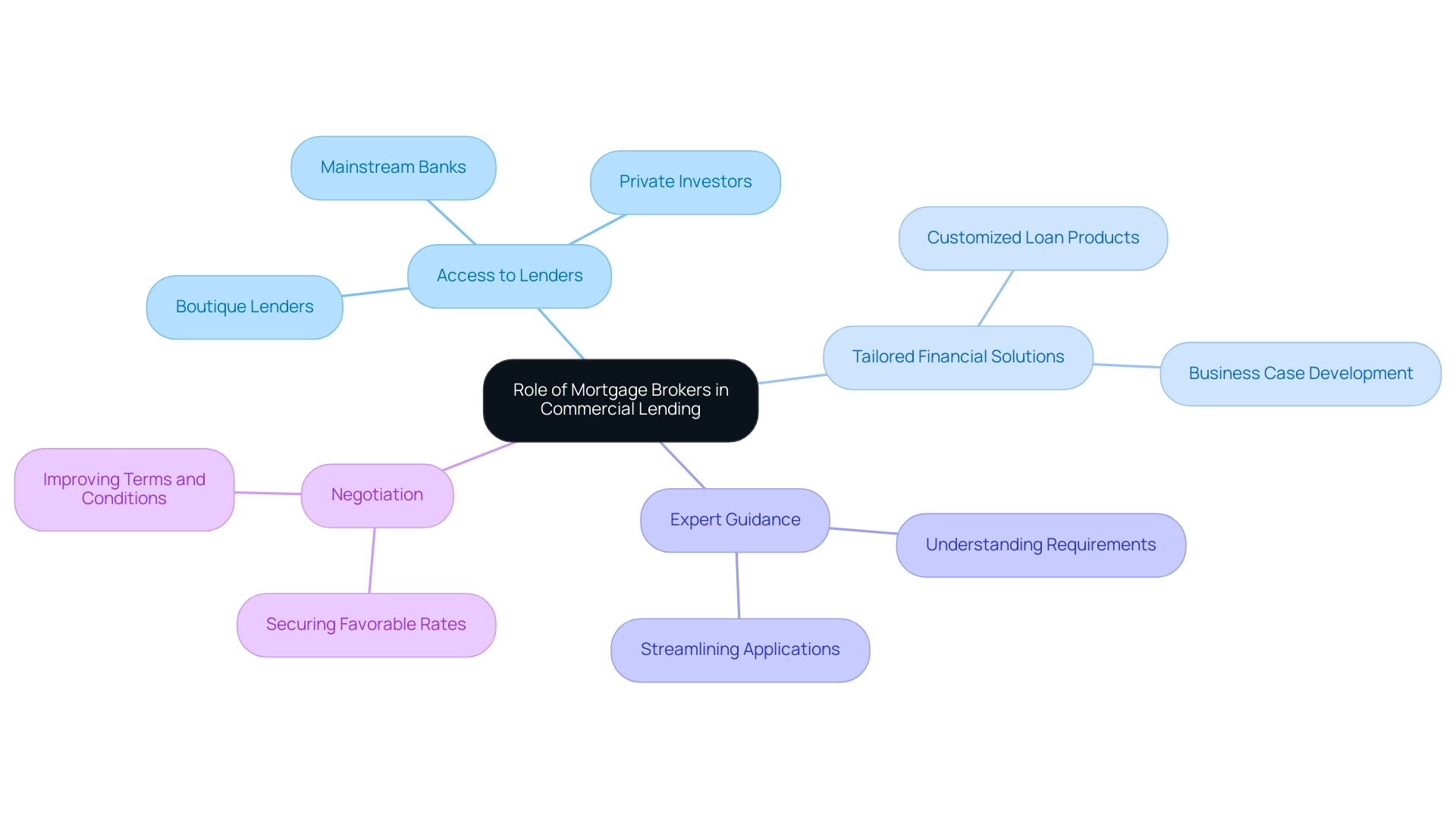Overview
Commercial loans in Australia serve as vital financial instruments that empower small to medium enterprises (SMEs) by supplying essential capital for operational needs, property acquisition, and business expansion. These loans are not merely funding sources; they are pivotal in driving economic growth and enhancing adaptability.
It is imperative for SMEs to understand that tailored financing solutions, coupled with a robust grasp of lending criteria, are crucial for successfully navigating challenges and seizing opportunities within a fluctuating economic landscape.
Introduction
In the dynamic landscape of Australian business, commercial loans are vital for small to medium enterprises (SMEs) seeking growth and stability. These financial instruments not only facilitate essential investments in property and equipment but also empower businesses to navigate economic fluctuations with confidence. As reliance on alternative financing options increases, understanding the intricacies of commercial loans becomes crucial for entrepreneurs eager to seize opportunities and enhance their operational capabilities.
This article explores the significance of commercial loans in Australia, examining various types, application processes, and the critical role of mortgage brokers in securing tailored financing solutions that meet individual business needs.
What Are Commercial Loans and Their Importance in Australia?
Commercial financing options are essential financial tools designed for enterprises, enabling them to address various operational needs such as property acquisition, equipment purchases, and cash flow management. In Australia, commercial loans play a crucial role for small to medium enterprises (SMEs), providing the necessary capital to expand operations, invest in innovative projects, or stabilize finances during challenging economic periods.
At Finance Story, we understand that the significance of business financing extends beyond individual enterprises; it is pivotal in driving overall economic growth. In 2025, the share of broker-originated financing from sources other than the major banks increased by 2 percentage points year-on-year, reaching 40% in the March quarter. This trend underscores the increasing dependence on alternative financing methods, which provide more competitive rates and customized solutions for SMEs, particularly through our extensive access to boutique lenders, private investors, and mainstream banks.
Expert opinions stress that commercial financing is essential for SMEs, especially in a fluctuating economic landscape. It empowers businesses to seize growth opportunities, adapt to market changes, and enhance their operational capabilities. For instance, Vishakha Agrawal noted that in December 2023, the Australian Government introduced a new personal financing scheme for first-time homebuyers, reflecting the evolving nature of financial products available to support various market segments.
Additionally, case studies on property investment financing assessments reveal significant improvements in serviceability evaluations, with fewer agreements being issued with an Interest Cover Ratio (ICR) below 1.5x. This cautious lending approach demonstrates a commitment to ensuring that SMEs can maintain their growth without overextending their financial capacities. Furthermore, the impact of commercial loans on enterprise growth is evident in how they enable strategic investments.
By providing access to necessary funds, commercial loans empower SMEs to innovate, expand their market reach, and ultimately contribute to the broader economy. Statistics suggest that the importance of lending for SMEs is underscored by their role in promoting resilience and adaptability, enabling enterprises to prosper even in uncertain times.
In summary, commercial loans are not merely financial products; they serve as a cornerstone of the Australian economy, empowering SMEs to navigate challenges and seize growth opportunities effectively. With a reputation for professionalism, Finance Story is well-positioned to assist clients in achieving their financial goals efficiently. As one of our satisfied clients, Natasha B. from VIC, stated, 'I will definitely be recommending your company to anyone.'
We alleviate the constant worry. We provide customized mortgage brokerage solutions for both corporate and residential financing, even in challenging situations, ensuring that we address the unique requirements of every client we assist.

Exploring the Various Types of Commercial Loans Available
In Australia, the landscape of financial offerings is diverse, featuring commercial loans designed to meet the unique demands of enterprises in 2025. The primary categories of financing options for businesses include:
- Property Financing: Essential for acquiring or refinancing real estate utilized for business purposes, these funds typically require a significant down payment and are secured against the property. This makes them a reliable choice for companies looking to invest in tangible assets. Finance Story specializes in crafting refined and customized cases to help clients secure these funds efficiently, whether for warehouses, retail spaces, factories, or hospitality projects.
- Commercial Loans Australia: These funds are aimed at providing capital for operational expenses, equipment purchases, or inventory management, making them crucial for sustaining and expanding business operations. They offer flexibility in terms of repayment and usage, catering to the evolving needs of enterprises.
- SMSF Financing: Self-Managed Super Fund (SMSF) financing enables individuals to invest in business properties through their superannuation funds. This option not only diversifies investment portfolios but also capitalizes on the tax advantages associated with superannuation. Finance Story provides expert guidance on managing SMSF investments in commercial real estate, ensuring tailored financing solutions that align with client goals.
- Expat Mortgages: Designed for expatriates looking to invest in Australian property, these financial products take into account the unique financial circumstances of overseas investors, facilitating access to the Australian property market.
- Refinancing Options: For businesses seeking to adapt to changing conditions, refinancing existing commercial debts can offer the necessary capital and flexibility. Finance Story presents a wide array of refinancing options that address the evolving demands of businesses, ensuring they can enhance their financial strategies.
Each financing category, including commercial loans in Australia, comes with specific eligibility requirements and terms, making it crucial for businesses to evaluate their particular needs before applying. Recent statistics reveal that the total value of new commitments for personal fixed-term financing reached $8.43 billion in December 2024, underscoring a strong demand for financial solutions across various sectors. This trend emphasizes the importance of understanding the property financing market, which continues to evolve with innovative lending solutions.
For instance, Finance Story exemplifies how flexibility in the lending process can enhance client outcomes. By leveraging a diverse portfolio of private lenders and mainstream financial institutions, the brokerage can present clients with a variety of tailored options, ensuring they can achieve their financial objectives effectively. This commitment to innovation is particularly evident in case studies showcasing successful financing for properties, such as the case study titled 'Innovative Lending Solutions,' which illustrates how a client secured a customized funding solution for a retail property acquisition, perfectly aligning with their operational needs.
As the property financing market in Australia continues to grow, it is vital for businesses seeking commercial loans to stay informed about the latest developments and market dynamics. Understanding these factors will empower small business owners to make informed decisions and secure the most favorable financing options for their ventures.
Key Criteria for Securing a Commercial Loan
Obtaining commercial loans in Australia requires adherence to specific standards set by financial institutions, which are essential for ensuring a successful application. At Finance Story, we understand the intricacies of this process and specialize in crafting customized financing proposals that address the unique needs of small business owners. The primary factors include:
- Creditworthiness: A robust credit score is paramount, serving as a key indicator of the borrower's ability to fulfill repayment obligations. In 2025, the average credit score for applicants seeking commercial loans in Australia hovers around 700, reflecting a competitive environment where financial institutions favor applicants with strong credit histories. It is important to note that if a borrower fails to meet a loan payment obligation, they will receive no less than 30 days' notice before enforcement actions are taken, underscoring the stakes involved in securing loans.
- Business Financials: Lenders demand comprehensive financial documentation, including profit and loss statements, cash flow projections, and tax returns. These documents offer insight into the company's financial stability and operational efficiency, allowing lenders to assess risk accurately. Our expertise in creating refined cases ensures that your financials are presented effectively.
- Purpose of the Funding: Clearly articulating the intended use of the funding is essential. This clarity assists financiers in assessing the associated risks and aligning the funding with the business's strategic objectives. We work closely with you to define and present these purposes convincingly.
- Collateral: Numerous business credits require collateral, such as real estate or equipment, to reduce risk for the financier. This requirement underscores the importance of having valuable assets that can secure the loan.
Grasping these criteria is essential for companies aiming to craft compelling applications that resonate with lender expectations. For instance, a recent case study on vehicle financing illustrates how businesses in the transportation sector successfully navigated these requirements by providing targeted financial documentation and demonstrating their operational needs. This approach not only facilitated approval but also optimized the financing terms.
In 2025, the standards for obtaining commercial loans in Australia reflect a growing emphasis on creditworthiness and financial transparency. Companies that meet these standards are better positioned to access advantageous financing rates and terms, including commercial loans in Australia, ultimately enhancing their growth potential in a competitive market. As Anna Bligh, Chief Executive Officer of the Australian Banking Association, states, "If you have a complaint about a banking service we have provided to you or think we have not met our obligations to you under the Code, contact us in the first instance."
This highlights the importance of transparency and accountability in the lending process.
Furthermore, Finance Story guarantees equitable and open procedures when selecting external property valuers and handling possible conflicts of interest, further strengthening its credibility in the context of obtaining business financing. With specialized knowledge in managing difficult financial circumstances and a committed lending ally in the UK for expatriate financing, Finance Story is well-prepared to support small enterprise owners in reaching their financial objectives. Our broad selection of lenders offers choices for different types of properties, including warehouses, retail locations, factories, and hospitality projects, along with refinancing options to address the changing requirements of your enterprise.

Navigating the Commercial Loan Application Process
Navigating the application process for commercial loans in Australia can initially seem daunting. However, a clear understanding of the steps involved can significantly streamline your experience. Here’s a comprehensive breakdown of the process:
- Preparation: Begin by gathering all necessary documentation, including financial statements, a detailed plan, and identification. Thorough preparation is essential, as it establishes the groundwork for a successful submission, particularly when crafting a refined case designed to meet financial institution expectations. Expertise in expressing your enterprise's strengths and financial viability is crucial.
- Choosing the Right Financial Institution: Conduct thorough research on various providers. Look for those that offer terms and conditions that best align with your business needs. Finance Story provides access to a complete variety of financial institutions, from high street banks to innovative private lending panels, ensuring you find the right fit. Consider factors such as interest rates, fees, and the lender's reputation for customer service. We can assist with financing options for various commercial properties, including warehouses, retail premises, factories, and hospitality ventures, through commercial loans in Australia.
- Submitting the Application: Complete the application form with accuracy and submit it alongside the required documentation. Attention to detail at this stage can prevent delays in processing, particularly when presenting a well-structured proposal that highlights your business's unique value.
- Assessment: After submission, the financial institution will review your application. This stage may involve additional questions or requests for further information to clarify aspects of your application. Having a responsive customer relations team, like that at Finance Story, can significantly ease this process, ensuring you are supported through inquiries.
- Approval and Funding: Upon approval, the financial institution will provide a financing agreement. Once you sign this agreement for commercial loans in Australia, the funds will be disbursed, allowing you to proceed with your business plans. Understanding these steps is essential for businesses looking to secure financing.
In 2025, the average duration to obtain commercial loans in Australia is approximately 4 to 6 weeks, depending on the lender and the complexity of the application. Recent statistics indicate that the share of total property exposures that are non-performing has decreased slightly, from 0.78 percent to 0.73 percent, reflecting a stable asset quality in the domestic property market. This stability contributes positively to the overall lending environment, making it a favorable time for companies to seek commercial loans in Australia.
Successful case studies highlight the importance of a responsive customer relations team in the lending process. For instance, PMA has built a reputation for transparent communication and a straightforward lending process, ensuring clients are informed at every stage. Their commitment to customer service enhances reliability and supports clients in navigating their funding needs effectively, particularly during the assessment and approval stages of the application process.
Additionally, it is worth noting that the Australian Bureau of Statistics has transitioned to quarterly reports, providing a more timely overview of lending indicators and market conditions. By following these steps and understanding the current lending environment, including refinancing options from experts like Finance Story, companies can position themselves for success in securing the funding they need.

Overcoming Challenges in Securing Commercial Financing
Securing commercial loans in Australia presents significant challenges, particularly within a fluctuating economic landscape. Small business owners often face considerable obstacles, including:
- Expertise in Tailored Loan Proposals: Crafting a polished and highly individualized business case is essential for meeting the increasingly stringent expectations of lenders. Finance Story specializes in developing these proposals, significantly enhancing the likelihood of securing funding.
- Strict Lending Criteria: Many financial institutions have tightened their lending standards, making it increasingly difficult for businesses to qualify for loans. This trend is exacerbated by current economic conditions, where financial institutions are more cautious. With higher profit margins resulting from cash rate hikes, these institutions can afford to increase their lending rates, further complicating the financing landscape.
- Insufficient Documentation: A common pitfall for applicants is the submission of incomplete or poorly organized documentation, which can lead to delays or outright denials. Engaging with a knowledgeable mortgage broker can ensure meticulous preparation.
- Economic Conditions: The broader economic environment plays a crucial role in influencing the willingness of financial institutions to provide financing. Economic downturns lead to heightened scrutiny as lenders seek to mitigate risk. Notably, 78% of founders are likely to expand their venture globally in the next 12 months, emphasizing the need for robust financing support.
- Credit History Issues: Businesses with less-than-ideal credit histories may find it particularly challenging to secure favorable loan terms, complicating their financing efforts.
To navigate these hurdles effectively, collaborating with financial consultants or mortgage brokers is advisable. Their expertise can guide organizations through the complexities of the lending landscape. A recent study revealed that 37% of founders prioritize flexibility in accessing funds, which is essential for managing cash flow and scaling operations.
This adaptability can be a game-changer, allowing organizations to stay competitive and responsive to market changes.
Moreover, as economic conditions evolve, presenting a compelling case to financial institutions is paramount. Engaging knowledgeable brokers can assist companies in overcoming strict lending criteria and improving their chances of securing commercial loans in Australia. Finance Story offers access to a complete range of financiers, including high street banks and creative private financing panels, ensuring customized funding solutions for diverse properties such as warehouses, retail spaces, factories, and hospitality ventures.
The case study titled "Importance of Flexibility in Accessing Funds" illustrates the real-world implications of flexibility in financing, reinforcing the need for adaptable banking solutions. As the finance industry continues to adapt to evolving market dynamics, utilizing expert insights and customized strategies will be essential for small enterprises striving to succeed in this challenging environment.
The Role of Mortgage Brokers in Commercial Lending
Mortgage brokers are essential participants in the landscape of commercial loans in Australia, acting as crucial intermediaries between borrowers and financiers. Their contributions are multifaceted and significantly influence the financing process for enterprises. Key roles include:
- Access to a Wide Network of Lenders: Brokers cultivate relationships with a diverse array of lenders, including boutique lenders, private investors, and mainstream banks. This enables them to offer clients a broad spectrum of financing options tailored to their specific needs.
- Tailored Financial Solutions: By thoroughly assessing the unique requirements of each company, brokers like Finance Story can recommend loan products that align with financial goals, ensuring a customized approach to financing. Their commitment to understanding business needs leads to effective collaboration in developing strong business cases for diverse lending requirements.
- Expert Guidance: Navigating the complexities of the lending process can be daunting. Brokers provide invaluable insights, helping clients understand intricate requirements and documentation, which can streamline the application process. Finance Story’s specialized expertise in challenging financial situations is particularly beneficial for clients seeking tailored solutions.
- Negotiation on Behalf of Clients: One of the most significant advantages of using a broker is their ability to negotiate terms and conditions with lenders. This can lead to securing more favorable rates and terms, ultimately benefiting the client’s bottom line.
In 2025, statistics suggest that around 60% of business financing in Australia is secured through brokers, highlighting their increasing impact in the market. This trend underscores the importance of brokers in facilitating access to financing, particularly in a complex interest rate environment where expert guidance is crucial. As Anja Pannek, CEO of the MFAA, states, "The mortgage lending landscape is complex, particularly given the current interest rate environment. The benefits derived from using a broker extend far beyond securing the lowest rate – it’s the education, guidance, and support they offer that sets mortgage brokers apart."
The advantages of using a mortgage broker for business loans extend beyond mere access to lower rates. As noted by industry experts, the education, guidance, and support provided by brokers are invaluable assets that enhance the overall borrowing experience. Finance Story has demonstrated specialized expertise in navigating challenging financial situations, which has proven essential for clients seeking bespoke mortgage brokerage solutions, particularly in the context of commercial loans in Australia and residential financing.
A testament to this is Natasha B. from VIC, who remarked, "I will definitely be recommending your company to anyone." We are finished with the constant worry. Once again, thank you so much for being a part of our journey. This illustrates the impact of Finance Story's ongoing relationship with clients, providing them with continuous support throughout their financing journey.
Case studies illustrate the effectiveness of brokers in securing successful financing outcomes. For example, a small enterprise owner seeking to expand operations faced difficulties due to stringent lending criteria. With the assistance of a knowledgeable broker, they were able to access a suitable loan product that not only met their immediate needs but also positioned them for future growth.
Overall, the role of mortgage brokers in corporate lending is increasingly acknowledged as a vital element of the financing process, particularly in facilitating commercial loans in Australia and offering companies the tools and support necessary to achieve their financial goals efficiently.

Future Trends in Commercial Loans and Financing Solutions
The commercial lending landscape in Australia is undergoing significant transformation, driven by several key trends that are set to shape the future of financing solutions, particularly for small business owners seeking tailored funding options with Finance Story.
- Increased Use of Technology: The integration of digital platforms and AI-driven solutions is revolutionizing the application process, enhancing speed and efficiency for borrowers. This technological advancement simplifies the experience and allows lenders to assess applications more accurately and swiftly, a hallmark of Finance Story's innovative approach to lending.
- Flexible Loan Structures: As companies navigate an unpredictable economic environment, the demand for flexible loan terms is growing. Borrowers are seeking arrangements that can adapt to their evolving needs, enabling them to manage cash flow and operational changes more effectively. Finance Story specializes in creating tailored solutions for both residential and commercial properties, ensuring that clients have access to financing that meets their specific circumstances.
- Focus on Sustainability: Reflecting a broader societal shift towards environmental responsibility, financiers are increasingly prioritizing funding for enterprises that demonstrate sustainable practices. This trend aligns with consumer preferences and positions companies to benefit from potential incentives and support from government initiatives aimed at promoting sustainability, a focus area for Finance Story in their loan offerings.
- Emergence of Non-Bank Financing Sources: Non-bank financing sources are expected to gain a greater portion of the market, offering alternative funding options that may be more accessible for specific enterprises. Their ability to provide tailored solutions is particularly advantageous for startups and small businesses that may face challenges with traditional banking institutions. Finance Story utilizes its extensive network of private lenders alongside mainstream financial institutions to deliver tailored solutions that address diverse organizational needs.
In addition to these trends, Finance Story excels in creating polished and highly individualized funding proposals, essential for securing resources for various developments. This expertise ensures that clients can present compelling cases to banks, enhancing their chances of approval.
In the Australian Capital Territory, the average amount borrowed for owner-occupier residences is approximately $377,000, providing a pertinent benchmark for enterprises seeking funding in the current market.
By staying attuned to these trends, small business owners can strategically position themselves to leverage emerging opportunities within commercial loans in Australia. Finance Story exemplifies this adaptability through its innovative lending process, equipping clients to navigate complex financial situations effectively.
As Mark Hutchins, Director of Secured Lending, notes, "In a potentially more cautious market, bridging loans can provide a safety net while securing pre-sales or long-term funding for completed projects." This insight underscores the importance of understanding the evolving landscape and the role of technology in shaping future financing options.
Furthermore, the case study titled "Innovative Lending Process" illustrates how Finance Story differentiates itself from competitors through its commitment to innovation and adaptability in the lending process. By leveraging its extensive network of lenders, including a full range of options for residential property investment and refinancing, Finance Story is well-equipped to assist clients in achieving their financial goals efficiently and effectively, even in a competitive market where wealth management presents growth opportunities alongside challenges related to fee transparency.
Conclusion
The exploration of commercial loans in Australia underscores their pivotal role in empowering small to medium enterprises (SMEs) to achieve growth and stability. These financial instruments transcend mere transactions; they serve as essential enablers for businesses to invest in property, equipment, and operational enhancements. By understanding the various types of commercial loans available—from property loans to business finance and SMSF loans—entrepreneurs are equipped with the knowledge to navigate their financing options effectively.
The application process for securing a commercial loan can be streamlined through careful preparation and the guidance of experienced mortgage brokers. By meeting key criteria, such as creditworthiness and providing thorough financial documentation, businesses can significantly enhance their chances of obtaining favorable loan terms. The challenges faced in this landscape, including stringent lending criteria and fluctuating economic conditions, highlight the importance of expert support in crafting tailored proposals that resonate with lenders.
Mortgage brokers play an invaluable role in this process, offering access to a wide network of lenders and negotiating terms that align with the unique needs of each business. Their expertise not only aids in securing loans but also fosters long-term relationships that contribute to ongoing financial success.
As the commercial lending landscape evolves, embracing trends such as technology integration and flexible loan structures will be crucial for SMEs aiming to thrive. By remaining adaptable and informed, businesses can leverage these developments to secure the financing they need to navigate challenges and seize opportunities. Ultimately, commercial loans are more than just funding; they are vital tools for fostering resilience and driving economic growth in Australia.




